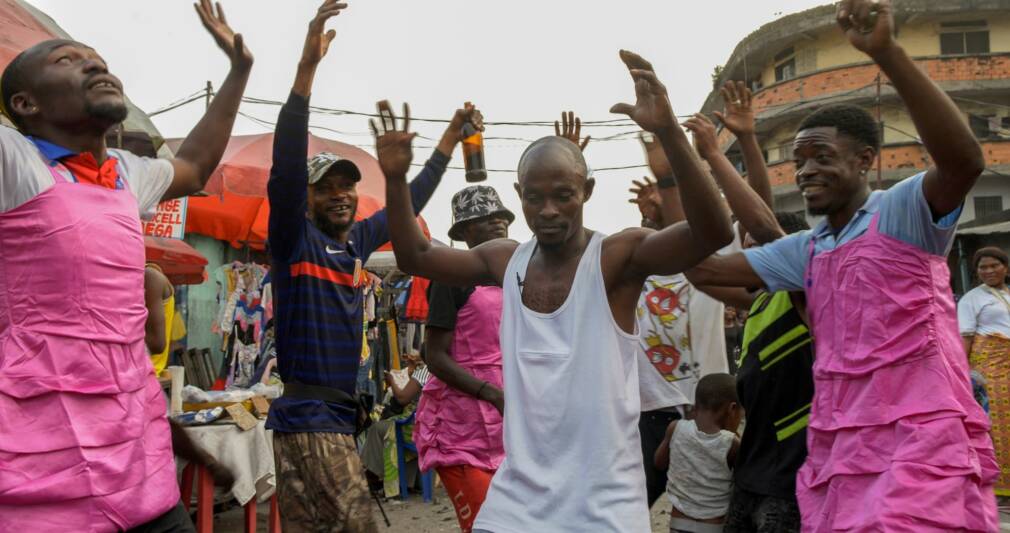PAM presents: Sitos, on alert in Kinshasa
This second installment from our documentary series Off the Map takes us to Kinshasa (CDR), the birthplace of zagué, an indescribable style celebrated by Sitos – a laborer by day and singer by night – among others. Movie by Florent de La Tullaye.
A man runs alone, on the 30 Juin boulevard. He looks at us straight on with a frank look and addresses us: “Here in Kinshasa, if you want to stay healthy, you have to exercise. Many young people are dying, and I don’t know if it’s because of witchcraft or lack of money. (…) We are Kinshasans, so we are fighters.” What better way to be welcomed to the urban jungle of Kinshasa than with this introduction in Sitos,Kinshasa sur le qui-vive[“Sitos, on alert in Kinshasa”], shot and directed in the Congolese capital by Florent de La Tullaye.
This man knows the city well, a place he has explored from top to bottom with his fellow work colleague Renaud Barret since 2004. Together, they have made several films, including La danse de Jupiter and Benda Bilili, both focusing on human stories that help to understand life in Kin through all of its music, and, vice versa, showcasing the city’s music from those who make it happen. So when PAM heard that the film director was held in Kinshasa during one of the European Covid lockdowns, we asked him to share with us one of his many stories – with sound and images, of course.
It came along at just the right time, when Florent had been gravitating for some time around the recording studio Timbela Ba Timbela Yo (“Be awake in order to be lucid”), a place where numerous musicians have been accompanied by the golden-fingered producer and arranger David Levi Ekofo. It was David who introduced Florent to the productions of Sitos, a former gang member, who retrained as a laborer by day and as a studio artist by night. “I already knew Sitos, he’s part of the studio’s inner circle and he works just around the corner, at the Zando market. David Levi Ekofo would make me listen to his productions, and as I asked them about these tracks, they told me everything about how music is distributed in Kinshasa – and that’s what got me interested in the first place, even before the music.”

Zagué style
Without a moment’s thought, Florent de la Tullaye offered to pay for Sitos to record a track and to document its evolution, from the vocal takes to the production and to the distribution, right up until it reached the ears of the Kinshasans. Which is what this 10-minute movie recounts, a documentary that uncovers the realities of the Zagué style. The term “Zagué” is a shortened form of the French expression “[être] aux aguets” – “[to be] on the lookout”; portraying the attitude of bandits, watchmen, pickpockets and henchmen who hold down the territory controlled by their gang, and listen to its soundtrack. “From one neighborhood to another, the director explains, ‘zagué’ music changes, and all its variations are linked to gangs, who each control their own territory. Sitos came from the ‘red army’ gang, a once very famous group.” In the movie, you see him chanting in the studio after a hard day’s work, inhabited by a great inner fire: “Papa te maman te, na moko” (“No father, no mother, I am alone”). Continuing with a list of the ten plagues of Kinshasa – not of Egypt: you need money to feed the kids, to send them to school, to pay for the studio… and when you see the life of Sitos, you can only admire his burning desire to speak, to sing, and to get by.
Of course, like so many of his friends, he could have been killed: whether in pitched battles between gangs – there’s a short sequence filmed by Florent de la Tullaye a few years ago that will give you an idea – or in the raids that police have been carrying out in neighborhoods since the end of the 2000s to clear them of gangsters and other kuluna (bandits)… although this policy didn’t always differentiate from the street people. “Many of their members were chased out or rounded up, fled, ended up in Brazza, in jail or even dead” tells the director. “Sitos, on the other hand, was saved by his own music.” It was, indeed, at the same time that he started to produce music, and even received moderate success with one of his first songs. From then, the police considered him an artist rather than a machete-carrying man.

Kinshasa music marketing
But as the Kinshasan rappers Bawuta Kin once sang, “life in Kinshasa is like playing a ping pong match against King Kong on the skyscrapers of Hong Kong.” You can tell, it’s not easy to live in this jungle, and even less so, to make a living out of music. Especially as Sitos has to take care of it all: pay for the studio for the recording and the production, pay all the younger DJs located on every street corner, every market, so that they play his new track delivered to them on a USB stick. Then this marketing campaign needs to continue in the clubs, in the hope that the song takes off: “and if it goes well, continues Florent, the Indian boss of the nightclub will perhaps ask him to perform a live show. And that’s when he could earn between 200 to 300 dollars.”
A self made artist and self made producer. Never far from the depravity of his old times, never far from grace. A grace he owes to the studio’s main arranger: “David Levi, he doesn’t drink, he doesn’t smoke: he’s a kind of monk who found himself in the middle of all these gangsters and he knows how to make them understand that there’s no point in trying to impress him if you want him to do good work”, explains Florent. And this has even become his specialty: “finding a balance between the creative side and the delinquent side” of those who come to him, says Levi in the film. Hoping, as Sitos does, that one day they will make the headlines and, above all, be recognized as artists more than thugs. In any case, as fighters. Discover the movie Sitos, Kinshasa sur le qui-vive on PAM’s Youtube channel, and soon an EP, marking Sitos’ first international release.
Sitos, Kinshasa sur le qui-vive has been selected by the Paris International Music Film Festival (FAME 2022).
A PAM production with the support of the CNC/Talent.
Listen to “Pasi Oyo” in our our afro + club playlist.
par Vladimir Cognolari, 16 juin 2022



